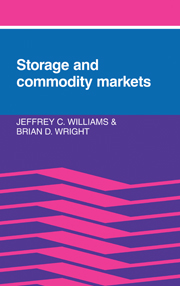Book contents
- Frontmatter
- Contents
- Preface
- Acknowledgments
- 1 Introduction
- Part I The basic model
- Part II Implications of storage for research on time series
- 6 Time-series properties due to storage
- 7 Tests of rationality
- Part III Extensions of the model
- Part IV Public interventions
- Part V Epilogue
- References
- Author index
- Subject index
7 - Tests of rationality
Published online by Cambridge University Press: 03 February 2010
- Frontmatter
- Contents
- Preface
- Acknowledgments
- 1 Introduction
- Part I The basic model
- Part II Implications of storage for research on time series
- 6 Time-series properties due to storage
- 7 Tests of rationality
- Part III Extensions of the model
- Part IV Public interventions
- Part V Epilogue
- References
- Author index
- Subject index
Summary
A great advantage of the storage model is its capacity to generate under controlled conditions infinitely long time series or infinitely many short time series. In a setting where underlying parameters and behavioral relations are known, accepted empirical techniques can be judged by how well they uncover those parameters and distinguish among hypotheses about agents' behavior. For example, it would be disquieting if ordinarily a common empirical technique for supply estimation assesses incorrectly the supply elasticity from data created by the storage model. By this standard, four basic empirical procedures are shown to be highly suspect:
tests of the forecasting ability of futures prices;
tests of bias in futures prices;
tests of excessive variability in the prices of assets like land; and
cobweb and adaptive expectations models of supply estimation.
Each of these procedures is inspected in a separate section in this chapter.
A common theme of these four empirical procedures is their implicit or explicit test of rationality. For example, if futures prices are biased, they are irrational forecasts; if supply follows cobweb behavior, it is irrational. Here we are testing the conventional tests themselves, not the rationality of futures prices or supply responsiveness in our data. Because the data are generated by stochastic simulation of our storage model, they are rational by construction. Because empirical results of these four tests have been used to question the hypothesis of rational expectations, this chapter, by calling the tests themselves into question, lends support to the assumption of rationality in the storage model.
- Type
- Chapter
- Information
- Storage and Commodity Markets , pp. 174 - 198Publisher: Cambridge University PressPrint publication year: 1991



